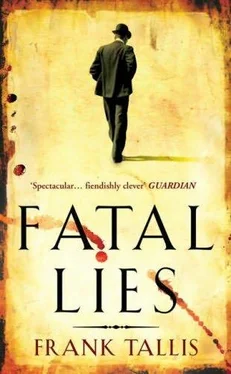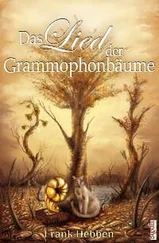Frank Tallis - Fatal Lies
Здесь есть возможность читать онлайн «Frank Tallis - Fatal Lies» весь текст электронной книги совершенно бесплатно (целиком полную версию без сокращений). В некоторых случаях можно слушать аудио, скачать через торрент в формате fb2 и присутствует краткое содержание. Жанр: Исторический детектив, на английском языке. Описание произведения, (предисловие) а так же отзывы посетителей доступны на портале библиотеки ЛибКат.
- Название:Fatal Lies
- Автор:
- Жанр:
- Год:неизвестен
- ISBN:нет данных
- Рейтинг книги:3 / 5. Голосов: 1
-
Избранное:Добавить в избранное
- Отзывы:
-
Ваша оценка:
- 60
- 1
- 2
- 3
- 4
- 5
Fatal Lies: краткое содержание, описание и аннотация
Предлагаем к чтению аннотацию, описание, краткое содержание или предисловие (зависит от того, что написал сам автор книги «Fatal Lies»). Если вы не нашли необходимую информацию о книге — напишите в комментариях, мы постараемся отыскать её.
Fatal Lies — читать онлайн бесплатно полную книгу (весь текст) целиком
Ниже представлен текст книги, разбитый по страницам. Система сохранения места последней прочитанной страницы, позволяет с удобством читать онлайн бесплатно книгу «Fatal Lies», без необходимости каждый раз заново искать на чём Вы остановились. Поставьте закладку, и сможете в любой момент перейти на страницу, на которой закончили чтение.
Интервал:
Закладка:
A child, thought Rheinhardt. Still only a child.
“Inspector?” Mathias's voice sounded querulous.
“Yes?”
“Why are you wearing tails?”
Rheinhardt sighed. He gave an account of the evening's events while Mathias pulled a cart of surgical tools over to Zelenka's table.
“Help me get his clothes off, will you?”
Rheinhardt baulked.
“Oh, come now, Inspector!” Mathias reprimanded. “Your coyness with the dead is becoming quite tiresome!”
The old man tutted and began to undo the buttons on Zelenka's woolen shirt. Rheinhardt reluctantly manipulated the boy's stiffening arms, and the shirt came off without too much difficulty. He then removed the boy's vest. Rheinhardt placed each article of clothing in a paper bag and sealed it. When he turned to assist Professor Mathias again, he found that the old pathologist was standing very still, staring at the body with intense interest.
“The trousers, Professor?”
Mathias grunted-but it was evident that the meaning of Rheinhardt s words had not registered.
“The trousers?” Rheinhardt repeated.
“Shh,” said the pathologist, waving his hand in the air. He then moved forward, his stealthy gait and purposeful gaze reminding Rheinhardt of a predatory animal. Suddenly, Mathias pounced. He lowered his head-his nose almost touching Zelenka's body. He then snatched a magnifying glass from the cart and began to examine the boy's chest.
“Professor?”
“Extraordinary.”
“What is?”
“Come here. Take a look at this.”
Rheinhardt could not see anything at first. But as he drew closer he saw that there was something unusual about the boy's skin: a patch, about the size of a five-krone coin, just above the right nipple, that seemed to be reflecting the light differently. As Rheinhardt lowered his head, he detected a lattice of faint white lines.
“Here,” said Mathias, handing Rheinhardt the magnifying glass.
The lens showed that the white lines were in fact tiny weals: raised ridges of pale flesh.
“What is it? A dermatological disease?”
“No, Rheinhardt. It's scar tissue. The skin has been slashed with a razor. The wounds have healed over now-but the manner in which they have healed suggests they were repeatedly reopened.” Mathias's magnified finger appeared beneath the glass. “The uppermost incision was once infected.”
“Could these cuts have been self-inflicted? I have heard of prisoners injuring themselves to relieve boredom.”
“Only if he is left-handed-a right-handed person would instinctively cut contralaterally thus inflicting wounds on the left pectoralis major.”
“I'm afraid I do not know which was his preferred hand.”
Mathias examined the boy's thumbs and then squeezed Zelenka's upper arms.
“He was right-handed,” Mathias said with absolute certainty. “His right thumb is slightly larger than the left, and his right biceps is more developed.”
“Very impressive, Herr Professor.”
Mathias did not acknowledge Rheinhardt's compliment, and his expression suddenly changed from one of confidence to one of perplexity. He lifted Zelenka's left arm and allowed it to swing out over the edge of the table.
“I thought I could feel something odd.”
A few centimeters below the boy's armpit was a square of bloody gauze. Mathias eased the dressing away revealing another network of cuts. Unlike those on Zelenka's chest, these had not healed. The lines of the crisscross pattern were black and scabby. Mathias closed his eyes and explored the wounds with his fingertips. They trembled over each crusty laceration, like those of a blind man reading braille. He then pressed the flesh until one of the cuts opened.
“Quite deep,” he said softly.
Rheinhardt scratched his head. “Have you seen wounds like this before?”
“No,” said Mathias, “I haven't.”
Rheinhardt puffed out his cheeks and let the air escape slowly.
“Is there some connection between these wounds and the boy's death?”
“There could be. For example, his blood might have become poisoned. But we must proceed further with the autopsy to find out.”
“Of course.”
“Hold him down, will you?”
Rheinhardt grimaced and gripped Zelenka's cold, waxy shoulders.
Mathias removed the boy's shoes and socks. He then loosened the youngster's belt and pulled off his trousers. Beneath these, Zelenka was wearing knee-length drawers with a button overlap and drawstring waist.
“Excuse me,” said Mathias to the corpse, tugging at the under garment and exposing the boy's genitals.
“God in heaven!” cried Rheinhardt.
Another square of bloody gauze was stuck to the boy's upper thigh.
The two men looked at each other.
“Haussmann!” Rheinhardt called.
The door opened and his assistant stepped over the threshold. “Sir?”
“We shall be needing the services of a photographer again.”
8
They had performed some popular songs by Carl Loewe- Edward, Prinz Eugen, Archibald Douglas — and were tackling his setting of Goethe's Erlkonig. It was a competent piece of lieder writing, although somewhat melodramatic. Even so, the two friends surrendered their musical sensitivities to the spirit of the work, and Liebermann was pleasantly surprised. Rheinhardt's baritone was particularly expressive, finding qualities in Loewe's arrangement that had previously escaped the young doctor's notice. When the final chords descended over a mysterious, rumbling bass, Liebermann was thrilled by the effect.
“Bravo, Oskar,” said Liebermann, clapping his hands together. “Exceptional. I haven't heard a better performance on the concert platform.”
Rheinhardt considered feigning modesty, but decided that this would be ungracious.
“Yes, it was rather good. The Heimlich passage in particular.”
“Indeed-I was utterly convinced. Chilling. Chilling!”
Rheinhardt rifled through the music books and found a volume of Schubert: Der Doppelganger?
“Yes, why not?”
Rheinhardt placed the book on the music stand-but it was not open at the right page. Instead of Der Doppelganger, the song title was-once again- Erlkonig.
Liebermann smiled at his friend and pointed out the error.
“Oh, I'm so sorry,” said Rheinhardt. But the inspector did not correct his mistake. Instead, he looked mischievously at his companion and said, “What do you think?”
Schubert's setting of Goethe's Erlkonig had a notoriously taxing part for the pianist: relentless octaves and chords played by the right hand and executed at breakneck speed.
Liebermann flexed his fingers.
“My wrist feels a little tired, but I think I can get through it.”
“Excellent.”
Liebermann launched into the torturous triplets of the introduction. Immediately the atmosphere in the room altered, a musical spell was cast, and they were both transported.
Storm clouds and the descent of darkness.
Merciless cold.
A galloping horse-its frantic hooves throwing up clods of turf.
“Wer reitet so spat durch Nacht und Wind?”
Who rides so late through night and wind?
A father and his son.
The boy buries his face in his father's cloak. When the father asks him what is wrong, the child replies that he has seen the elf king.
Liebermann attacked the keys of the Bosendorfer, manipulating the pedals to create an expansive-almost orchestral-sound.
The father tells the boy that he is seeing mist, but the elf king is calling- and the boy clutches even more tightly at his father's cloak.
“Sei ruhig, bleibe ruhig, mein Kind.”
Be calm, keep calm, my child.
Rheinhardt's voice shook with authentic terror. Liebermann glanced up to see his friend gazing into the distance-his eyes searching for a spectral crown and train. Inhabiting the skin of the doomed child, Rheinhardt cried out: “The elf king has hurt me!”
Читать дальшеИнтервал:
Закладка:
Похожие книги на «Fatal Lies»
Представляем Вашему вниманию похожие книги на «Fatal Lies» списком для выбора. Мы отобрали схожую по названию и смыслу литературу в надежде предоставить читателям больше вариантов отыскать новые, интересные, ещё непрочитанные произведения.
Обсуждение, отзывы о книге «Fatal Lies» и просто собственные мнения читателей. Оставьте ваши комментарии, напишите, что Вы думаете о произведении, его смысле или главных героях. Укажите что конкретно понравилось, а что нет, и почему Вы так считаете.












